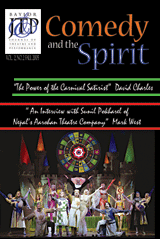Comedy and the Spirit
Fall 2005
Letter To The Editor
Editorial: The Spirit of Comedy
Gary Maciag
Abstract: It might seem odd at first to consider the comic and the spirit having any relationship at all in an era when religion and its practices have become deadly serious. Still, luckily, laughter has not been banished from our world. People laugh in the face of danger, even if that simply means not changing one’s behavior in the vague, ghostly presence of dire threats – perhaps not a particularly moving expression of heroism but maybe at least a small triumph of the will. Can religion and the life of the spirit be the bases of comic relief – in the sense of liberation – as much as, if not more so, than terror and suspicion?
Feature: The Power of the Carnival Satirist: Taking Laughter Seriously
David Charles
Abstract: Utilizing theories of satire and laughter, in particular Mikhail Bakhtin’s understanding of thecarnivalesque, David Charles investigates methods of spontaneous theatre practice used to pursue serious work. Analyzing mission statements, performance history, and audience reception of performances by Second City, ComedySportz, Pittsburgh’s Church Ladies, and others, the author demonstrates how the theatrical carnival spirit can expose artificial hierarchical, racial, and gender barriers yet also reinforce existing negative stereotypes. This essay considers how many spontaneous improvisational troupes seek to move beyond the temporary space of carnival to pursue active social-political agendas that empower performers and audience.
Feature: Wickedly Devotional Comedy in the York Temptation of Christ
Christopher Crane
Abstract: Satan opens the York Temptation of Christ pageant by employing a complex and subtle rhetorical comedy aimed at moving fifteenth-century spectators toward lives of greater devotion. Although this pageant employs carnivalesque comedy that violates the boundary between stage and spectator and appears subversive of orthodox teaching, the comedy ultimately invites audience members to recognize evil in themselves, a necessary step to repentance and obedience. This rhetorical tactic serves the York cycles broader religious aims of reinforcing orthodox doctrine and encouraging devotion in the audience. The effect of this identification is not as clear, however, when a character appears attractive to the audience through his comically transgressive words and actions. Characters in the cycle plays, like the York Satan, appear to threaten the orthodox message by entertaining the audience, yet the spirit of misrule they cultivate becomes itself part of that message when the characters-and the spectators identifying with them-are set in opposition to God and Christ. The orthodox aim of what may at first appear to be subversive comedy depends on the common faith of the medieval audience. Such drama points to a faith that not only gave freedom to laugh, but a faith strengthened through the comedy, which reminded spectators of their own fallibility and made the forgiveness and grace at the center of that faith more inviting.
Highlight: Questioning Caste: Performance, Parody and the Political Economy of a Hindu State. An Interview with Sunil Pohkarel
Mark West
Abstract: Mark West speaks with Sunil Pokharel, Artistic Director of the Aarohan Theatre Group, about the importance of humor in Nepalese kachahari forum theatre. Inspired by Augusto Boal’s Theatre of the Oppressed, kachahari forum theatre confronts social issues such as governmental corruption, gender discrimination, and the marginalization and dehumanization of Dalits (“Untouchables”) through interactive performances emphasizing conflict resolution. Many of the injustices addressed in the kachahari performances stem from the Hindu caste system and its inextricable connection with Nepal’s bureaucracy, which maintains the power imbalance between the upper and lower castes. In this interview, Pokharel expands on the creative process of crafting subversive theatre in a nation silenced by state censorship, and explores the use of humor as a means of entertainment, a method of therapy, and an essential tool for social change.
Profile: Rising Image Productions & Target Practice
W. Barrett Huddleston
Abstract: The article describes the project of Rising Image Productions, the largest theatre company exclusively devoted to staging C.S. Lewis theatre adaptations in the United States. The writing provides specific insight into the company’s adaptation of the Screwtape Letters, Target Practice, and attempts to critically analyze the process of translating Lewis’s work into a humorous musical performance. Further analysis compares Rising Image’s adaptation choices to Commedia Del Arte’ tropes, with special emphasis on the resemblance between the play’s central characters and Arlecchino and Pantalone.
Book & Performance Reviews:
- Victor Emeljanow-Theatre and Social Change, Alisa Solomon (Ed.)
- James M. Brandon-Staging the Savage God, Ralf Remshardt
- Peter Senkbeil-Performance Theory, Richard Schechner
- Jill Stevenson-“Altar Boyz” at Dodger Stages, Brooklyn, NY
- Jamie Gianoutsos-“The Magic Flute” at Baylor University, Waco, Tx
- Daniel Inouye-“Spamalot” at the Schubert Theatre, New York, NY

